| Srl | Item |
| 1 |
ID:
124900
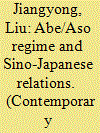

|
|
|
|
|
| Publication |
2013.
|
| Summary/Abstract |
The establishment of the "Abe/Aso regime" is one result of the rise of the Japanese right-wing forces. The Abe government has denied Japanese aggression history and tried to revise the Japanese Constitution in order to reconstruct powerful military forces. It has also used the Diaoyu Islands issue to serve its domestic and foreign policy objectives, causing a serious backslide in Sino-Japanese relations.
|
|
|
|
|
|
|
|
|
|
|
|
|
|
|
|
| 2 |
ID:
126409
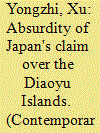

|
|
|
| 3 |
ID:
130613
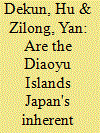

|
|
|
|
|
| Publication |
2014.
|
| Summary/Abstract |
"Historians believe that historical essays have nothing to do with the science of history and are actually harmful. Indeed, authors of such essays, whether intentionally or unintentionally, leave traces of themselves and their time. The same is true of editorials and reviews found in today's newspapers." ' The Origins of the Japan-China Territorial Issue, a new book by Mr. Murata Tadayoshi, an honorary professor at Japan' s Yokohama National University is also an example of what the Contemporary Historian, Mr. Chen Yinke, was referring to in the above. It is common knowledge that after Japan's Noda cabinet adopted its "nationalization" policy over the Diaoyu Islands on September ll, 2012, the Sino-Japan relationship began a downward spiral, while rivalry between non-govemment groups from both nations escalated. The Diaoyu
Islands dispute has become a hot topic for both the media and academia. Among the many works on the topic, Professor Murata's is quite unusual. While tensions remain high between China and Japan, his book carries an impressive argument as shown by work's subtitle-FaZsz?ed Facts in Japanese Government Papers. The cover of the book also features the question--"Are the Diaoyu Islands an inherent part of Japan's territory?"
|
|
|
|
|
|
|
|
|
|
|
|
|
|
|
|
| 4 |
ID:
106563
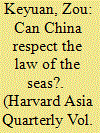

|
|
|
| 5 |
ID:
130626
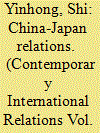

|
|
|
| 6 |
ID:
126398
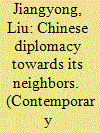

|
|
|
| 7 |
ID:
130627
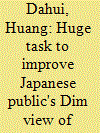

|
|
|
| 8 |
ID:
130624
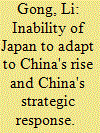

|
|
|
| 9 |
ID:
126858


|
|
|
| 10 |
ID:
120498
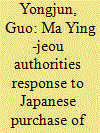

|
|
|
|
|
| Publication |
2013.
|
| Summary/Abstract |
The Ma Ying-jeou Authorities have played a key role in the latest round of dispute over the Diaoyu Islands. The "East China Sea Peace Initiative", put forward by Ma, was aimed at enlarging Taiwan's international space. Taiwan also tried to avoid affecting its close relationship with the U.S., and rejected the possibility of joint defense with the Mainland China. However, some tacit understanding has developed between the two sides over this dispute.
|
|
|
|
|
|
|
|
|
|
|
|
|
|
|
|
| 11 |
ID:
130565
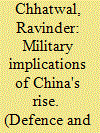

|
|
|
| 12 |
ID:
120798


|
|
|
|
|
| Publication |
2013.
|
| Summary/Abstract |
Tensions between China and Japan are rising, but an economic version of mutual deterrence is preserving the uneasy status quo. Put simply, China needs to buy Japanese products as much as Japan needs to sell them.
|
|
|
|
|
|
|
|
|
|
|
|
|
|
|
|
| 13 |
ID:
144537
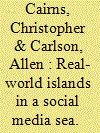

|
|
|
|
|
| Summary/Abstract |
During August and September 2012, Sino-Japanese conflict over the Diaoyu/Senkaku Islands escalated. Alongside street demonstrations in China, there was an outpouring of public sentiment on China's leading micro-blog, Sina Weibo (微波). Using human and computer-assisted content analysis, we exploit original Weibo data to measure how public sentiment in China fluctuated over the dispute, and ask two questions. First, how cohesive and volatile were online nationalist sentiments? Second, we measure government censorship of Weibo in order to ask which sentiments did authorities allow to be expressed, and when? We first find that many of the micro-bloggers' harshest invective was directed not at Japan but at their own government. Second, while censorship remained high across topics for most of the dispute, it plummeted on 18 August – the same day as bloggers' anger at Beijing peaked. These observations suggest three theoretical explanations: two are instrumental-strategic (“audience costs” and “safety valve”) and one is ideational (elite identification with protesters).
|
|
|
|
|
|
|
|
|
|
|
|
|
|
|
|
| 14 |
ID:
141458
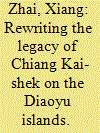

|
|
|
|
|
| Summary/Abstract |
The intensifying disputes between China and Japan over the Diaoyu Islands today have reminded both academia and the general public of the Ryukyu problem. Reportedly, during the Cairo Conference in 1943, Chiang Kai-shek let slip opportunities to recover the Ryukyus, which later resulted in Japanese control of the Diaoyu Islands. Until now, scholarship has maintained that Chiang narrowly missed regaining Okinawa at Cairo, which never again appeared on his agenda. However, a more nuanced historical account can be found in rarely accessed primary resources such as Chiang's diaries and presidential papers, which yield a different conclusion—that he was, in fact, committed to the Ryukyu issue throughout his political career. However, Chiang lost multiple opportunities to resolve the issue as a result of competition with his communist rival, the security dynamics of the Cold War, and his personality. Chiang eventually failed to stop America from returning the Ryukyus to Japan, which, thereafter, generated the Diaoyu Islands disputes and continues to serve as a primary source of nationalist friction today in Sino–Japanese relations.
|
|
|
|
|
|
|
|
|
|
|
|
|
|
|
|
| 15 |
ID:
120500
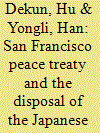

|
|
|
|
|
| Publication |
2013.
|
| Summary/Abstract |
As the San Francisco Peace Treaty has violated the principle of "not making a separate armistice or peace with the enemy" and denied the allies' provisions for the disposal of Japanese territory, it is illegal and invalid, and cannot form the Japanese "legal basis" for their so-called Diaoyu Islands being Japan's "inherent territory."
|
|
|
|
|
|
|
|
|
|
|
|
|
|
|
|
| 16 |
ID:
128028
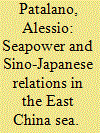

|
|
|
|
|
| Publication |
2014.
|
| Summary/Abstract |
The East China Sea (ECS) is gaining an increasingly central role in Sino-Japanese relations as it is crucial to the economic development and political affirmation of both countries, for whom the main sea routes crossing the ECS offer vital arteries for trade and energy imports. For the past year and a half, the ECS has attracted considerable international attention because of the flare-up of tensions over the sovereignty of the Japanese-controlled Senkaku Islands. This small group of islands is also claimed by the authorities in Beijing and known in Chinese as Diaoyu. Is war looming? Are we seeing an escalation spiral that will ultimately set the two countries on a collision course? The article argues that the current tensions should be seen in the wider context of the increased strategic significance of the ECS. For there are two different types of disputes here. One concerns sovereignty over the Senkaku/Diaoyu Islands; the other concerns the demarcation of the Chinese and Japanese maritime borders and exclusive economic zones (EEZ) as defined by the United Nation Convention on the Law of the Sea (UNCLOS). This distinction is important because sovereignty on land is different from sovereignty at sea. The former is connected to a vital national interest and historically, represented a primary reason for war. The latter focuses on functional rights over bodies of water included in the EEZ, not on the actual 'ownership' of the maritime realm. Accordingly, the article argues that seapower is going to play a crucial role in the projection of Japanese and Chinese power and status in the ECS and in the evolution of Sino-Japanese relations more generally. Significantly, Naval Defence doctrines in both countries have evolved greatly over recent years.
|
|
|
|
|
|
|
|
|
|
|
|
|
|
|
|
| 17 |
ID:
148501
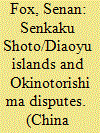

|
|
|
|
|
| Summary/Abstract |
The Senkaku Shoto/Diaoyu Islands dispute in the East China Sea and the Okinotorishima dispute in the western Pacific are currently among the most prominent maritime disagreements between Japan and China. Both disputes are influenced by neorealist strategic and material interests in relation to sea lines of communication, the demarcation of maritime territory, exclusive economic zones (EEZs), and continental shelf claims. Despite material similarities, it is the issue of the rightful ownership of the historically sensitive Senkaku Shoto/Diaoyu Islands that has seriously strained bilateral relations. The way that the disagreements manifest themselves arguably reflects the central role that such liberal and constructivist themes as emotion, identity, nationalism, and domestic politics play in the dispute. The Senkaku Shoto/Diaoyu Islands dispute in particular is one where domestic politics and ideational influences play a disproportionately strong role in escalating tensions and complicating attempts at resolution. This article aims to examine the shared and contrasting ideational and material aspects of these two disputes, and to show how these interests shape Japan’s and China’s respective approaches in both cases. It thus sheds some light on when and why Sino-Japanese ideational and material interests intersect and how they affect bilateral relations.
|
|
|
|
|
|
|
|
|
|
|
|
|
|
|
|
| 18 |
ID:
180309
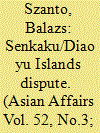

|
|
|
|
|
| Summary/Abstract |
The article takes a critical look at the current state of the Senkaku/Diaoyu Islands dispute in light of the recent escalation between China and Japan. The article's central thesis is that the practical significance of the dispute has diminished considerably due to developments in the security and economic spheres. Rather, the dispute continues to exist and escalate because of the domestic political interests of the respective governments. This recognition is important to manage the dispute effectively, to avoid hyperbolic arguments about the dispute's conflict potential, and similarly to avoid undue comparisons with the South China Sea. This article adopts a realist, rational-choice based approach to demonstrate the diminishing nature of the security and economic significance of the islands, which underpins a decreasing rationale for actively seeking an alteration of the status quo. The question of why the dispute continues to escalate is highlighted in the article's examination of how the Liberal Democratic Party of Japan and the Chinese Communist Party use the islands as a political symbol to pursue their own domestic and regional political agenda, in a way only tangentially connected to the actual dispute.
|
|
|
|
|
|
|
|
|
|
|
|
|
|
|
|
| 19 |
ID:
130621
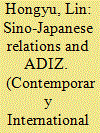

|
|
|
| 20 |
ID:
120504
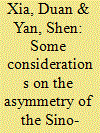

|
|
|
|
|
| Publication |
2013.
|
| Summary/Abstract |
There are various Sino-Japanese economic interdependences. How to judge the advantages of each and the possible price for both sides of interdependence after the "Diaoyu Islands event"? This article attempts to search for answers to the asymmetry in Sino-Japanese economic interdependence and its impact.
|
|
|
|
|
|
|
|
|
|
|
|
|
|
|
|